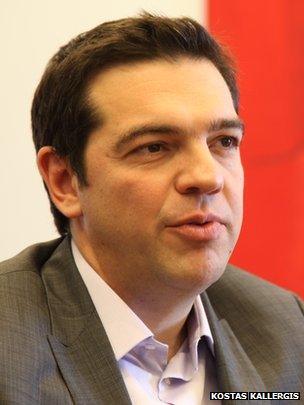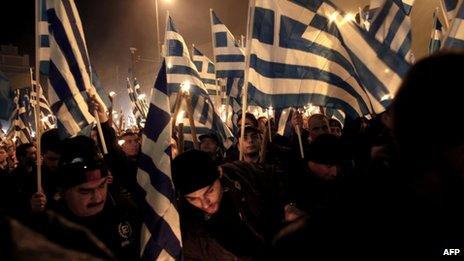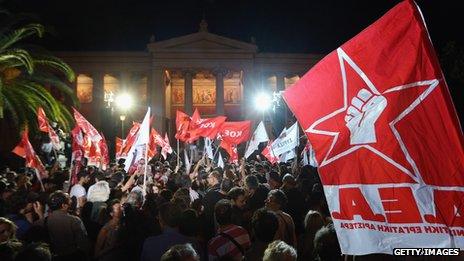'Blackmail, terrorism and tension' - Greek left turns up rhetoric
- Published
- comments
Greece is a country where economic crisis has given way to social crisis.

At 37, Tsipras is Greece's youngest political leader
The far right on the march, tube strikes have paralysed the capital. Now there is growing political violence.
The police have moved to clear out anarchist squats. Political party offices have been firebombed.
Last month, someone fired a Kalashnikov at the HQ of the ruling party, New Democracy.
Now the opposition leader Alexis Tsipras has upped the ante, accusing Prime Minister Antonis Samaras's government of pursuing a "strategy of tension", akin to that allegedly pursued by the Italian secret service in the 1970s.
Speaking to a packed audience at an Athens theatre on Monday, he said:
"In 1969, a bomb in Piazza Fontanta in Milan left 17 dead.
"This was the dawn of a long period where far right and fascist groups, in total collaboration with the Italian secret services, the parallel state, and the state within a state, developed what came to be called 'the strategy of tension'.
"Today the manuals of European extreme right have become the gospels of present Greek government."
So far the coalition government - which includes conservatives, social democrats and a small ex-communist party - has managed to stabilise the fiscal crisis, winning key concessions from the IMF and EU.
But if - amid political tension - the coalition were to fall, Mr Tsipras would be in with a serious chance of becoming Europe's first far-left prime minister of the post-Cold War era.
I met him in his offices in the Greek parliament on Tuesday. I asked him: "Are you seriously saying the Greek state is pursuing a secret strategy of creating violent tension?"
"It's not exactly a secret strategy," he says. "I think that it's now obvious that this government is the most right-wing and the most extreme government this country has ever had since the political changeover after 1974.
"It's obvious that the prime minster, Mr Samaras, is trying to establish an agenda which intensifies political conflict and aims at creating a sense of fear within the Greek society, in order to achieve two separate goals: firstly, to get people not to think of the economy, to scare them and have them thinking primarily of their own safety - about the dangers related to the immigrants or demonstrations.
"And secondly, to try and bring together the most conservative parts of our society, in order to establish a stable basis for his own political sway.
"But this strategy, I believe, is a very dangerous one for democracy itself."
The "strategy of tension" refers to the dark days of European politics in the Cold War.
After the Piazza Fontana bombing, an anarchist being questioned died in custody. Numerous trials - of leftists and far-right activists - in the ensuing decades, failed to establish a perpetrator.
The allegation at the time, as far-left and far-right terrorism took off in Italy, was that the violence was being fomented by the "secret state", to justify curtailing democracy.
So for Mr Tsipras to use this phrase in the Greek context is, to put it mildly, cranking up the political stakes - because there is real political tension in Greece.
This month, four anarchists were caught trying to rob a bank. The police Photoshopped their arrest mug-shots because the injuries they received made them barely recognisable.
The injuries were allegedly received while in police custody. Meanwhile, police have recently made arrests of people allegedly connected to a terror group called Conspiracy of the Cells of Fire and found arms caches.

Mr Tsipras says he would have 'zero tolerance' with Golden Dawn
Amid this, the challenge for Mr Tsipras's party, Syriza, is what would you do if you gained power? About Golden Dawn? About anarchist bank robbers?
An already hostile Greek media is asking if Syriza is a party that could ever run the Greek state.
"We will implement the law," Mr Tsipras tells me. "We will rigidly follow the letter of the law. And we shall have zero tolerance towards Golden Dawn, which is a gang, violating the law.
"We shall also uproot all Golden Dawn cells located within the [police and civil service]. We will not tolerate illegal behaviour from anyone or any group.
"And all those groups using violence, claiming that they belong to the anarchist field - a fact I personally do not believe in, because I believe that the use of violence is the most authoritarian act one can exercise - those groups too, will be facing the legal repercussions."
Public support for Syriza, and Mr Tsipras, dipped when the opposition party publicly backed a tube strike that paralysed Athens.
Though they scored 27% in the elections, and nearly won, their opponents see Mr Tsipras's complaints about democracy as crying wolf.
Thanos Veremis, Hellenic Foundation for European and Foreign Policy, told me:
"The paradox here is that Mr Tsipras is crying wolf.
"His party is going down in the polls and that has caused some panic among the party cadres.
"It's a fact that recently the government is taking advantage of throwing Tsipras's own statements back at him, in order to convince the undecided voters. Mostly because the undecided voters are not radicals - the radicals are where they want to be, whether of the left or right."
I ask Mr Tsipras whether the Syriza should now admit that the coalition has stabilised the fiscal situation, and that Syriza's proposed policy - of a selective moratorium or default - would have just crashed the Greek economy?
"No serious person could admit something like this. Look at the data," he replies.
"In Greece, in the last three years, in order to reduce the Primary Deficit of the government by 25bn euros ($33bn, £21bn), we reduced the internal demand by 70bn euros - that is the Greek economy shrunk by 70bn euros.
"It's like having seen a snake in a tree and deciding to burn the entire forest, to get rid of the snake."
Mr Tsipras has been on the offensive since the IMF admitted it had miscalculated - ie underestimated - the negative impact of spending cuts and tax rises on the Eurozone economy. He is scathing about this controversy about the so-called "multiplier effect":
"They admit that they failed to calculate correctly the multiplier. But, please, allow me to say that if this kind of mistake was to be revealed in any company, and if the people who made the mistake came forth and admitted it, the company would have at least reimbursed the client and would have fired the employees who made the mistake.
"Here we have the following sadistic absurdity: the IMF admitting that they have made a mistake, but continuing with the plan, without even an apology."
"And what's even more absurd, it's that the client does not protest! The Greek government is saying 'no problem, you made a mistake and we continue with this mistake'."

Syriza is Greece's second-largest political party
Mr Tsipras has been feted in Rio, Buenos Aires, and even the think-tank circuit in Washington recently.
But his own supporters are restive. There is a growing minority within Syriza which supports leaving the euro.
And the rank and file see the growth of the far right and fear that, while the far right are expressing raw anger, Mr Tsipras and the party's new MPs, look more and more like mainstream politicians - who on the Greek streets are despised.
I ask him: "Who are you? Are you the man of the parliamentary opposition or are you the man who is going to lead the strikers out here into a mass uprising against this government?"
"I think that this is exactly our biggest advantage. We can be at the same time the parliamentary opposition and tomorrow the government. At the same time we can be down in the streets, fighting and mobilising the masses.
"This is probably what they cannot accept, the political, the economic and the media authorities in Greece. Because in Greece we are governed by an oligarchy. It's the oligarchy of the media and of the plutocrats.
"So, we do have this advantage. We can participate in a protest, motivating people to defend their rights, while at the same time, we can be in Washington discussing with the IMF, the State Department or in Germany, conversing with Schauble, in order to voice the fair demands of the Greek people.
"We have one and a half million people unemployed, one and a half million people with a monthly wage lower than 600 euros.
"And the main question for me and for all of us involved in politics is how will all those people survive? How will these people live?
"And in order for those people to live, they need to defeat the fear and claim their rights. That's why I am here. I'm here to help those people claim what's theirs."
Not forgotten
On the night Syriza lost the election I was in the party's cramped HQ.
One of the party's activists told me: "We lost, that's great for us." The assumption was that, as the economic crisis deepened, it would be Syriza next in power.
Syriza leader Alexis Tsipras: "I think that it's now obvious that this government is the most right-wing and the most extreme government this country has ever had''
But the governing parties, through their PR teams, are relentlessly forcing the issue with Mr Tsipras: parliament or the streets? Syriza activists privately admit the party is reeling under the pressure.
But Mr Tsipras knows that - even if the country's finances are stabilized - with relentless austerity the governing parties are acutely vulnerable to issues raised by the past.
"If our government and Mr Samaras believe that he can run this country for ever, using blackmail, terrorism and the tension strategy he is sadly mistaken. Because the Greek people have a long tradition of democracy and struggle."
By raising the half-forgotten events of Italy in the early 1970s, Mr Tsipras is reminding Greeks of never-forgotten events: the anti-Nazi Resistance during World War II, the Civil War, the military junta in the 1960s and its overthrow in 1974.
It is another throw of the dice in Greece, a country whose crisis is nowhere near over.